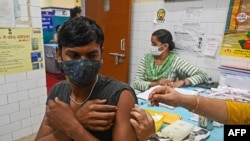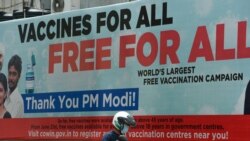Amid increasing global pressure, India says it is closely examining the resumption of COVID-19 vaccine exports to the world, particularly Africa, which is badly in need.
India is the largest manufacturer of vaccines, but it stopped exporting them in April to fight a major surge of the virus that it now largely has under control.
A source with knowledge of the decision, who requested anonymity as he is not authorized to speak with the media about it, told Reuters that with at least 61% of India's population of 944 million people having received at least one dose of coronavirus vaccine, the country now has a surplus.
The apparent decision to restart exports comes as Indian President Narendra Modi prepares to visit Washington next week for a summit of the leaders of the so-called Quad countries — the United States, India, Japan and Australia.
"The export decision is a done deal," the source said. "India wants to help out Africa with both vaccines and its COVID operational model."
On Tuesday, the World Health Organization said it is in ongoing discussions with Indian officials to resume those supplies with the global vaccine-sharing platform COVAX.
"We have been assured that supply will restart this year," senior WHO official Bruce Aylward said.
Meanwhile, the African Union lashed out at vaccine makers, saying they are not giving them a decent chance to buy vaccines. It implored manufacturing countries — especially India — to remove the export controls. Of the 5.7 billion doses of coronavirus vaccines injected globally, just 2% have been in Africa.
The European Union is pledging to donate 200 million doses of COVID-19 vaccines to low-income countries by mid-2022.
European Commission President Ursula von der Leyen made the pledge Wednesday in Strasbourg, France, during her annual State of the European Union speech before the European Parliament. Von der Leyen said the 200 million doses the EU plans to contribute will be in addition to an earlier promise of 250 million doses, which she described as "an investment in solidarity, and it is an investment in global health."
Von der Leyen said "the scale of injustice and the level of urgency is obvious," with less than 1% of all global doses of COVID-19 vaccines administered in low- and middle-income countries.
"Let's do everything possible so that it does not turn into a pandemic of the non-vaccinated," she told EU lawmakers.
Some information for this report came from the Associated Press, Reuters, and Agence France-Presse.






